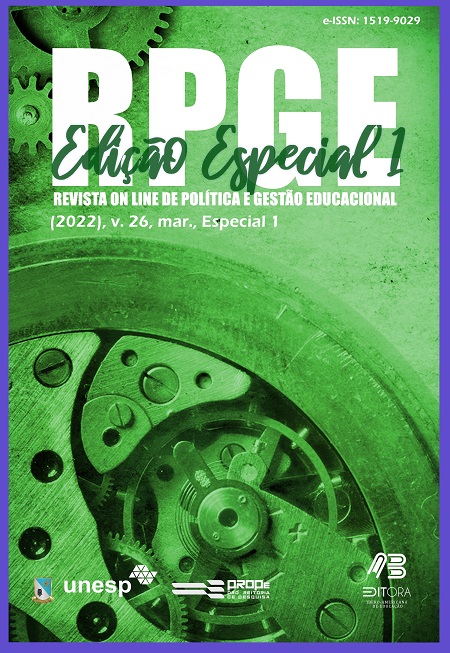Abordagens gerenciais e educacionais dos gestores desportivos às situações de crise na pandemia Covid-19
DOI:
https://doi.org/10.22633/rpge.v26iesp.1.16504Palavras-chave:
Pandemia, Esportes, GerenteResumo
Objetivo da pesquisa, a pandemia também mostrou seus efeitos no campo dos esportes. O adiamento ou cancelamento das competições restringia o desenvolvimento dos atletas e de suas áreas de trabalho, fazendo com que os atletas não pudessem se dedicar integralmente ao esporte. A pesquisa foi realizada em modelo de triagem relacional durante o período da pandemia, 375 homens e 193 mulheres que trabalhavam em clubes esportivos amadores consistindo em um total de 568 pessoas. A “Escala de Gestão de Crises” desenvolvida por Sayın (2008) foi utilizada com o formulário de informações pessoais. A escala possui 45 itens e 6 subdimensões e está em forma de escala Likert de cinco pontos. O valor encontrado foi 85 para Coeficiente alfa de Cronbach. O programa Data IBM SPSS Statistics 26.0 Package foi usado. Sistema de alerta precoce, propagação de danos, aprendizagem aparecem positivo, preparação e prevenção, reparo e recuperação são negativos, crise mostra nível médio.
Downloads
Referências
ADAMSON A. D.; PEACOCK G. G. Crisis response in the public schools: A survey of school psychologists; experiences and perceptions. Psychology in the Schools, v. 44, n. 8, p. 749-764, 2007.
AKDEMİR, A. Transformations in Management Thinking and Transformative Leader Profile. Istanbul: Leadership Symposium in the 21st Century. Naval Academy, v. 2, 1997.
AKTAS, S. Comparison of the decision-making styles of the managers of the ministry of youth and sports and the ministry of national education. 2014. Thesis (Master’s degree) – Department of Physical Education and Sports, Dumlupınar University Institute of Health Sciences, Kütahya, 2014.
CENER, P. Crisis Management. 2007. Available: http://danismend.com/kategori/altkategori/kriz-yonetimi-1. Access: 10 Jan. 2021.
CETİNALP, H. Crisis management in Sports Companies. 2014. Thesis (Master’s degree) – Department of Business Administration, Institute of Social Sciences, Halic University, Istanbul, 2014.
DEVECİOGLU, S. Crisis management in sports organizations. In: CONGRESS OF SOCIAL FIELDS IN PHYSICAL EDUCATION AND SPORTS, 2003, Ankara Sözel. Proceedings […]. Ankara Sözel, 2003.
DİNCER, N. A research on decision making styles and problem solving skills of sports managers. 2013. Thesis (Doctoral degree) – Institute of Health Sciences, Department of Physical Education and Sports, Gazi University, Ankara, 2013.
FILIZ, E. Crisis management in Turkish public administration. Istanbul: Alfa Actual Publications, 2007.
HARD TIMES IN SPORT. 2020 till 31 Dec. Available: https://daktilo1984.com/forum/sporda-zor-zamanlar-2020. Access: 10 Jan. 2021.
IMAMOGLU, A. F. Functional meaning and importance of sports management. Gazi University Journal of Gazi Education Faculty, v. 8, n. 1, p. 22-33, 1992.
KARASAR, N. Scientific Research Methods. Ankara: Nobel Publications. 2020.
KEYDER, C. Notes on the crisis. (Acted by Durmuş A). Journal of Society and Science, v. 14, p. 3, 1981.
MEREY, B. Comparison of the relationship between self-confidence and anxiety level in adults and an intercultural approach. 2010. Thesis (Master’s degree) – Institute of Social Sciences, Department of Psychology, Clinical Psychology, Maltepe University Istanbul, 2010.
MR, N. Examining the crisis management strategy in secondary education institutions (The Case of Istanbul Province). 2008. Thesis (Doctoral degree) – Institute of Educational Sciences, Department of Educational Sciences, Department of Educational Administration and Supervision,Marmara University Istanbul, 2008.
OZALP, I. Management and organization-I. 1. ed. Anadolu University Web-Offset Facilities, p. 6-8, 2012. (Anadolu University Publication No: 2564, Open Education Faculty Publication No: 1534)
OZDEN, K.; OZMAT, M. The epidemic and the city: the social, political and economic consequences of the 1347 plague epidemic in Europe. Ideal City, n. 12, p. 60-87, 2014.
RAMAZANOĞLU, F.; ÖCALAN, M. The understanding of business and personnel management in sports enterprises. Fırat University Journal of Oriental Studies, v. 1, n. 4, p. 36-40, 2005.
SANDERS, R. P. The decision-making styles, ways of knowing, and learning strategy preferences of clients at a one-stop career center. 2008. Thesis (Doctoral degree) – Southern Oklahoma State University, Faculty of the Graduate College of the Oklahoma State University, Stillwater, Oklahoma, 2008.
ŞİRİN T. et al. ShouldThe Football Leagues Start InTheShadow Ofcovid-19? PandemicPolicies Of NationalAnd International Sports Organizations. PONTE, v. 76, n. 6/1, p. 60-69, 2020. DOI: 10.21506/j.ponte.2020.6
TABACHNİCK, B. G.; FİDELL, L. S. Using Multivariate Statistics. 6. ed. Boston: Pearson, 2013.
TOKGÖZ, N. Basic concepts of strategic management. strategic Management. Anadolu University Web Offset Facilities, p. 163-169, 2012.
YURTSIZOĞLU, Z. The Story of a Crisis in the Sports Industry (Covid-19). Sivas Cumhuriyet University Journal of Sport Sciences, v. 2, n. 1, p. 45-50, 2021.
Downloads
Publicado
Como Citar
Edição
Seção
Licença
Copyright (c) 2022 Revista on line de Política e Gestão Educacional

Este trabalho está licenciado sob uma licença Creative Commons Attribution-NonCommercial-ShareAlike 4.0 International License.
Manuscritos aceitos e publicados são de propriedade da Revista on line de Política e Gestão Educacional. É vedada a submissão integral ou parcial do manuscrito a qualquer outro periódico. A responsabilidade do conteúdo dos artigos é exclusiva dos autores. É vedada a tradução para outro idioma sem a autorização escrita do Editor ouvida a Comissão Editorial Científica.











